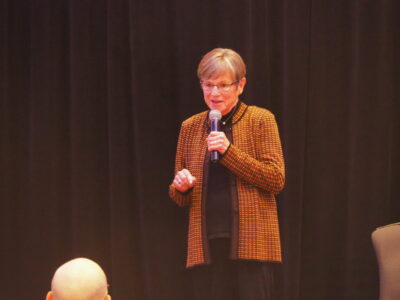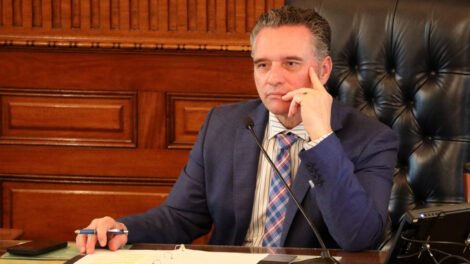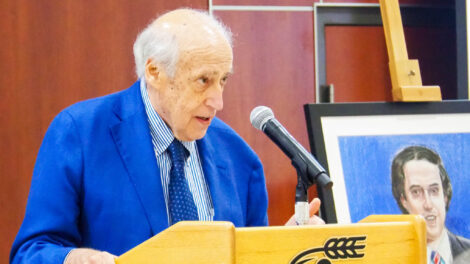Bill to limit diversity, equity and inclusion activities at universities may get new attention at Kansas Statehouse

photo by: Chris Conde
Strong Hall Directory pictured here on Jan. 19, 2022, on the first floor of Strong Hall at the University of Kansas.
A bill that would create questions about how University of Kansas officials can address issues of diversity, equity and inclusion may get a second life in the Kansas Legislature this session.
Lawmakers in both houses last year passed a provision, as part of the governor’s budget, that would place significant limits on how KU and other state universities can interact with individuals on the issues of diversity and equity. Gov. Laura Kelly vetoed the provision, and a vote in the Kansas House to override the veto fell three votes short.
But that vote did not kill the issue. Legislative rules allow bills from last session to remain alive in certain circumstances, and a filing earlier this week at the Statehouse indicates a bill addressing the issue — HB 2460 — may get a hearing this session. On Tuesday the bill was transferred out of the House Appropriations Committee and moved to the House’s Higher Education Budget Committee.
It is not a guarantee that the bill will get a hearing in the Higher Education Budget Committee, but its recent movement makes that a possibility. Rep. Steven Howe, R-Salina, was involved in the introduction of the bill, and he is the chair of the Higher Education Budget Committee.
The bill often has been characterized as one that would prohibit universities from using “loyalty oaths” that require job applicants to adhere to certain principles related to diversity, equity and inclusion.
But the actual language of the bill goes beyond just job applicants. It also would impact prospective students and current faculty members. Specifically the bill says: “No postsecondary educational institution shall condition admission or educational aid to an applicant for admission, or hiring, reappointing or promoting a faculty member, on the applicant’s or faculty member’s pledging allegiance to or making a statement of personal support for or opposition to any political ideology or movement, including a pledge or statement regarding diversity, equity, inclusion, patriotism or related topics, or to request or require any such pledge or statement from an applicant or faculty member.”
KU officials generally have not stated how they believe the bill would impact KU’s ability to run its multitude of diversity, equity, inclusion and belonging programs.
“It’s early in the session, and we are still learning about this and other pieces of legislation that will impact higher ed in the state,” university spokeswoman Erinn Barcomb-Peterson told the Journal-World via email earlier this week. “We look forward to working with lawmakers on this item in the days and weeks ahead.”
KU does require specific training in DEIB issues for new hires and existing staff. But it is not clear whether any of the university’s programs would fit the definition of a pledge. When she vetoed the provision last session, Kelly expressed concern the provision would have a negative impact on the operations of state universities.
In her veto message, Kelly said the provision would limit “universities’ efforts to find a skilled workforce that prepares our students for an ever-changing economy, and it limits their ability to support students from all backgrounds throughout their higher education experience.” Kelly also said the provision would “threaten” the ability of universities to secure some federal funding and research dollars.
In other news, the first few days of the legislative session have produced several proposals related to KU and higher education. Most of the provisions were included in the governor’s recommended budget. Here’s a look at several:
• KU and other Regents universities seemingly won’t be held back from seeking tuition increases next year. In past years, the governor and legislature have conditioned pots of higher education funding on a promise from the Kansas Board of Regents that it would not approve any increases in tuition for the next year. However, the section of the governor’s budget that addresses tuition does not ask for any such promise this year, although legislators still could seek such a deal.
• The governor is recommending $20.5 million in state funding for KU to use on a new joint project between KU and Wichita State University to build a new medical center campus in downtown Wichita. The project would replace KU’s medical center campus in Wichita, but would do so with a joint facility that would include spaces for WSU’s nursing program and other health care-related degrees.
• Look for more buildings to be razed at KU and other state university campuses. The governor’s budget includes $18.4 million for building demolition in the current 2024 fiscal year, and another $10 million in the 2025 fiscal year. Those funds are shared among KU and the other universities. At KU, the money has funded the demolition of Oliver Hall and several smaller buildings. The Kansas Board of Regents has directed universities to look at whether they have an excess of buildings as enrollments have declined at many universities. Regents have told the universities to consider demolition rather than repair if the buildings are badly deteriorated.
• The governor is recommending that KU, WSU and Kansas State University again receive special funding for an initiative to train more engineers. The engineering schools of the three universities would share in $10.5 million of funding for a special University Engineering Initiative, which is designed to increase the number of engineers in the Kansas workforce. The money is proposed to come from proceeds of the Kansas Lottery.
The governor’s recommended budget must still win approval from the Kansas House and Kansas Senate before it can be implemented. Debate on the budget likely will last through the session, which is scheduled to adjourn in May.







